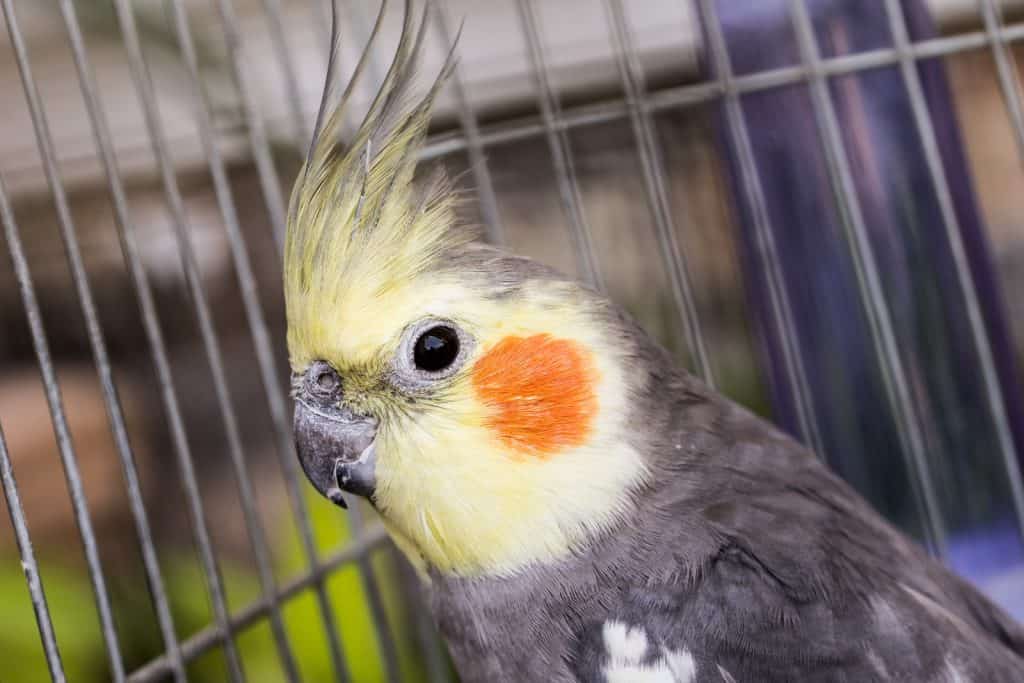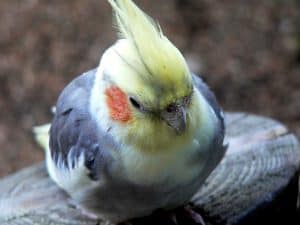Many pet bird enthusiasts consider cockatiels to be one of the most intelligent birds and popular choices for household companions. However, the question often arises: can an old cockatiel be tamed? Despite common belief, older cockatiels can indeed be tamed. These charming birds can adapt to new environments and form deep bonds with their human caretakers, regardless of their age.
In this blog post, we will delve into the factors that affect taming an older cockatiel and offer helpful tips for training them. We will also provide a step-by-step guide to facilitate the taming process, which requires patience and dedication from cockatiel owners. So, whether your pet bird is a young bird or an adult cockatiel, we hope this information will be helpful in your journey.
Factors that Affect the Taming Process
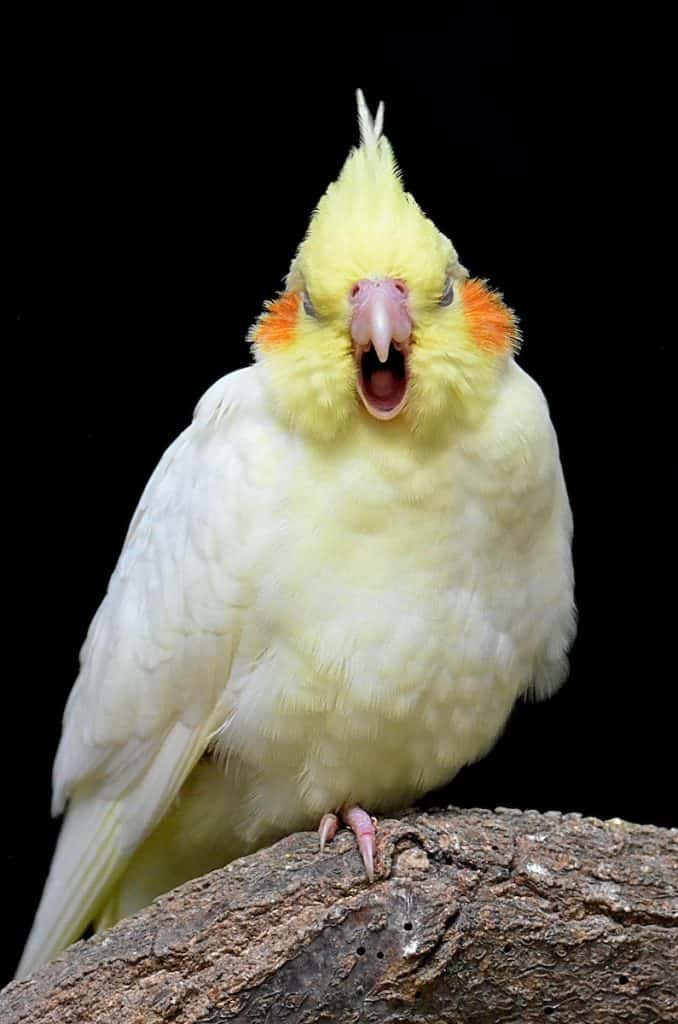
There are several variables that influence the ease of taming an older cockatiel:
1. Previous Experiences and Interactions with Humans
An older bird’s background significantly affects the taming process. If an older cockatiel has had positive human interactions or a past owner who employed proper training techniques, the bird may be more receptive to taming. On the other hand, an older bird with a history of neglect or mistreatment might take more time and patience to tame.
2. Level of Socialization and Exposure to Different Environments
Older cockatiels who have been exposed to different environments and other pets are generally more adaptable than those that have lived in isolation. Socializing cockatiels with other birds and household members early on can help promote desirable behavior.
3. Health and Overall Wellbeing of the Bird
A stressed or unwell cockatiel will find it more challenging to adapt to new situations and training sessions. It is crucial to monitor your pet’s health throughout the taming process and ensure that they are comfortable in their new environment.
Can an old cockatiel be tamed? Taming an Older Cockatiel: Step-by-Step Guide
Step 1: Understanding the Bird’s Body Language and Vocalizations
Before starting training sessions, it is vital to learn your cockatiel’s body language and vocal cues. Be observant of their animated facial expressions and movements, such as fluffing feathers or wagging tails. A relaxed bird will have a calm demeanor and may even make soft, happy sounds.
Step 2: Building Trust Through Gradual Interaction
To tame an older cockatiel, it is crucial to establish trust. Start by spending time near the cage, talking softly and maintaining eye contact. Initially, allow the cockatiel to set the pace by observing how they react to your presence and offering treats like sunflower seeds or millet spray through the cage bars.
Once the bird shows signs of comfort, such as accepting treats, you can begin to teach them to step up onto your finger. Open the cage door slowly, ensuring not to startle them. Gently push your finger against the bird’s lower chest, encouraging them to step up. If your bird is hesitant or hand shy, remember that it takes patience and persistence to build trust.
Step 3: Introducing Basic Training and Commands
Introducing clicker training can be an excellent way to tame birds, including older cockatiels. Clicker training involves using a small device that makes a clicking sound to bridge the gap between good behavior and receiving a treat. This technique allows the cockatiel to associate positive actions with rewards.
Begin by targeting training–using a small stick, encourage the bird to touch the tip with their beak. Once they do this, click the clicker and offer a treat. The next step is step-up training, which enhances their willingness to sit on your finger or hand. By following the same procedure–click, treat, and praise–the bird will progressively become more comfortable.
Step 4: Reinforcing Positive Behaviors and Maintaining Consistency
To ensure successful taming, consistency is key. Regularly conduct training sessions and always reward good behavior with treats and praise. As your older cockatiel becomes more confident, you can gradually introduce other tricks or commands, such as “sit” or “fly.” Keep in mind that while most parrots can learn to imitate speech, cockatiels are not as accomplished at talking as other species. They do, however, excel at learning simple tricks and commands with time and patience.
Tips for Making the Taming Process Smoother
1. Create a Safe and Comfortable Environment
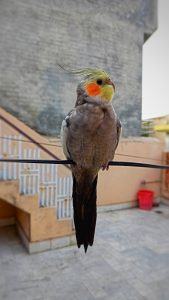
An older cockatiel’s cage should provide safety and comfort. Place it in a quiet area of the house, away from loud noises and commotion, but still within sight of daily activities to encourage socialization. Include perches, toys, and food and water dishes to keep your pet satisfied and entertained.
2. Encourage Socialization with Other Birds and People
Exposing the older cockatiel to different people and other birds can help them become more sociable and adaptable. However, take care to ensure these interactions are gentle and not overwhelming.
3. Monitor the Bird’s Health and Wellbeing
Maintaining the older cockatiel’s health throughout the taming process is crucial. If you observe signs of stress or illness, consult with a cockatiel expert or veterinarian for advice.
4. Be Patient and Persistent
As the saying goes, “Rome wasn’t built in a day,” and it applies to taming an older cockatiel as well. Be patient, consistent, and optimistic; your dedication will be rewarded.
- TEXTURE: An excellent beak trim toy, the textures of the wooden disks and leather strands encourage chewing and shredding to keep your bird busy and anxiety free with these toys parrot toys
- HOURS OF FUN: The Spinning Falls bird toys for parrots provide hours of fun; Your bird can climb, spin, and chew on this toy for near-endless entertainment
- SAFE FOR BIRDS: The wood pieces are dyed using natural food dyes, so your feathered friend can play it safe while having fun!
- VIBRANT: VIBRANT: This toy is comprised of brightly-colored wooden shapes hanging on multiple leather strings that will keep your feathered friend engaged for hours
- EASY INSTALLATION: The Spinning Falls toy attaches easily to any cage, ensuring your bird can start playing as quickly as possible
Challenges of Taming an Older Cockatiel
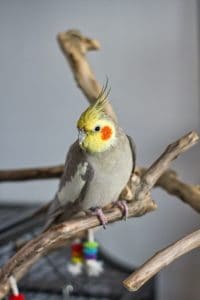
Despite the potential for success, there are challenges to taming older birds:
1. Possibility of Ingrained Negative Behaviors
An older cockatiel may have picked up bad habits in their past life that are difficult to break. Overcoming these behaviors may take longer than training a younger bird from scratch.
2. Differences in Sociability and Adaptability
Older cockatiels might be more stubborn and less adaptable than younger ones due to their set routines. Nonetheless, with patience and perseverance, taming can still be successful.
3. Time and Effort
Older cockatiels may require more time and effort to tame than younger birds, as trust-building and habit reformation can be slower processes. However, the rewards are worth the investment.
Final Thoughts: Can an old cockatiel be tamed?
So, can an old cockatiel be tamed? The answer is a resounding yes. Although it may take additional time and dedication, older cockatiels are equally capable of forming deep bonds with their owners and becoming tame birds.
By following the guidelines in this blog post, such as understanding body language, offering treats, and employing consistent training sessions, you can foster a trusting relationship with your older cockatiel and provide them with a new lease on life.
Remember that patience and devotion are essential in the taming process. Eventually, you will witness the transformation of your once untamed bird into a loving companion who enjoys human interaction and adds joy to your life.
